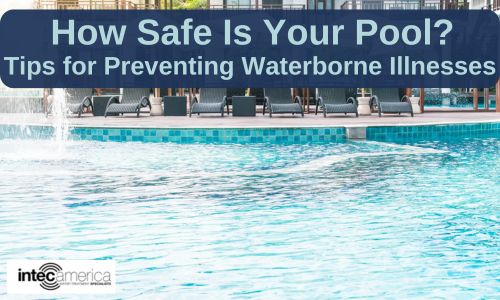A sparkling blue pool might look inviting, but is it truly safe for swimming? A swimming pool is meant to be a place of relaxation and fun, but poor maintenance can turn it into a breeding ground for bacteria, viruses, and other harmful contaminants. Without proper sanitation and water treatment, pools can expose swimmers to water-related diseases, skin irritations, and other health risks.
So, how can you confirm healthy pool water and prevent water pollution-related diseases? Let’s explore the key steps to maintaining a safe and hygienic swimming environment.
Why Pool Hygiene Matters
Keeping your pool water clean goes beyond aesthetics—it’s essential for protecting the health of everyone who uses it. Poor pool maintenance can lead to hygiene-related diseases, skin infections, and respiratory issues. Issues like diseases related to water pollution can arise when bacteria, algae, and other contaminants are left unchecked.
A well-maintained pool reduces the risk of waterborne illnesses and confirms a pleasant swimming experience. The key lies in proper sanitation, filtration, and chemical balance.
Signs Your Pool May Not Be Safe
Even if the water appears clear, it doesn’t guarantee that it’s free from harmful pathogens. Be alert to these warning signs:
- Cloudy or Green Water – Indicates bacterial or algae growth.
- Strong Chlorine Smell – A sign that chlorine is breaking down contaminants, not that the water is clean.
- Slimy or Slippery Pool Walls – Suggests biofilm buildup from bacteria and algae.
- Eye or Skin Irritation – Often caused by unbalanced pH or excess contaminants.
Proactive maintenance and the right sanitation solutions, like copper ionization, help eliminate these risks before they become a problem.
Essential Pool Hygiene Practices to Prevent Illnesses
To maintain healthy pool water, follow these essential hygiene practices:
- Keep the Water Chemistry Balanced
Maintaining the right balance of pH, and alkalinity is important for healthy pool water. An improper balance can lead to bacteria growth, skin irritation, and ineffective disinfection. Regularly test your water and adjust the levels accordingly.
💧 Ideal Pool Chemistry Levels:
✔ pH: 7.2–7.6 (7.0-7.4 for an ionized pool)
✔ Alkalinity: 80–120 ppm (60-80 for an ionized pool)
Also Read: Why Keeping Your Pool Alkalinity Balanced is Crucial?
- Regular Cleaning & Debris Removal
Leaves, dirt, and other debris introduce organic matter that can encourage bacteria and algae growth. Regularly skimming the pool, vacuuming the bottom, and brushing pool walls prevent buildup and maintain pool hygiene in swimming areas.
- Daily: Skim debris off the surface
- Weekly: Vacuum and brush pool walls
- Monthly: Deep clean tiles and waterline
- Use a Copper Ionizer for Continuous Sanitization
Copper ionization is an advanced water treatment method that:
- Leaves a sanitizing residual to inactivate bacteria and algae.
- Eliminates chlorine dependence, making the water gentler on skin and eyes.
- Prevents biofilm buildup, reducing the risk of hygiene-related diseases.
- Creates long-lasting water sanitation, making pool maintenance easier.
Unlike chlorine, which degrades over time, copper ions remain active in the water, continuously sanitizing and preventing contamination.
- Encourage Good Swimmer Hygiene
- Shower before entering the pool.
- Avoid swimming if you have an infection or illness.
- Encourage children not to swallow pool water.
How to Maintain a Healthy Pool Year-Round
✔ Weekly Maintenance
- Test water chemistry and adjust as needed.
- Skim leaves and debris.
- Check the filter and pump system.
✔ Monthly Deep Cleaning
- Brush pool walls and vacuum the bottom.
- Inspect and clean the pool filter.
- Check copper ionizer electrodes and clean them if needed.
✔ Seasonal Adjustments
- Before winter: Balance water chemistry and cover the pool.
Why Copper Ionization is the Best Long-Term Solution
Traditional chlorine-based pool sanitization requires constant chemical adjustments, which can be costly and irritating to swimmers. Copper ionization offers a safer, more sustainable alternative.
If you’re looking for a low-maintenance, highly effective way to keep your pool safe, a copper ionizer is the ideal solution.
Final Thoughts: A Clean Pool is a Safe Pool
A well-maintained pool isn’t just about sparkling water—it’s about safety. Taking proactive steps to ensure pool hygiene reduces the risk of water-related diseases and creates a healthier swimming experience. By balancing water chemistry, ensuring proper filtration, and considering advanced solutions like a copper ionizer, you can effectively prevent hygiene-related diseases and enjoy a clean, worry-free pool.
Want to upgrade your pool’s safety? Invest in the right pool maintenance practices and enjoy crystal-clear, healthy pool water all season long.
Explore our copper ionization systems today!
Recent Blog Posts
- https://www.intec-america.com/blog/is-it-time-for-pool-remodeling-recognize-the-signs-explore-solutions/
- https://www.intec-america.com/blog/how-hard-water-affects-your-pool-and-what-to-do-about-it/
- https://www.intec-america.com/blog/tips-to-avoid-costly-pool-maintenance-mistakes/
- https://www.intec-america.com/blog/pool-closing-checklist-everything-you-need-to-know/
- https://www.intec-america.com/blog/eco-friendly-pool-care-with-non-toxic-solutions/
- https://www.intec-america.com/blog/why-keeping-your-pool-alkalinity-balanced-is-crucial/
- https://www.intec-america.com/blog/how-to-identify-and-fix-common-pool-leaks/
- https://www.intec-america.com/blog/choosing-the-right-pool-liner/



